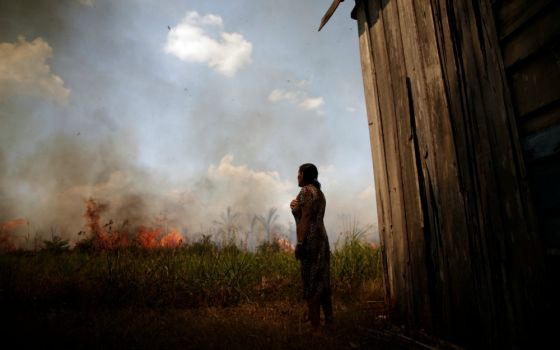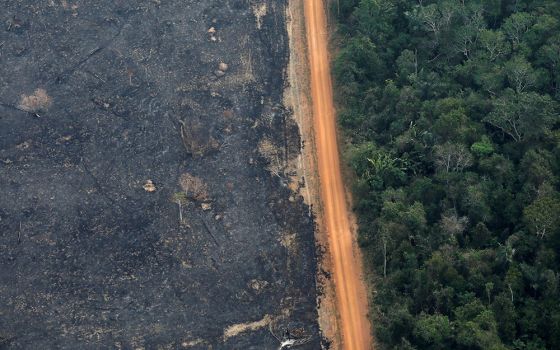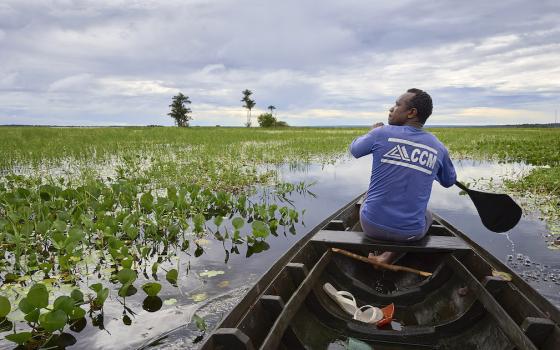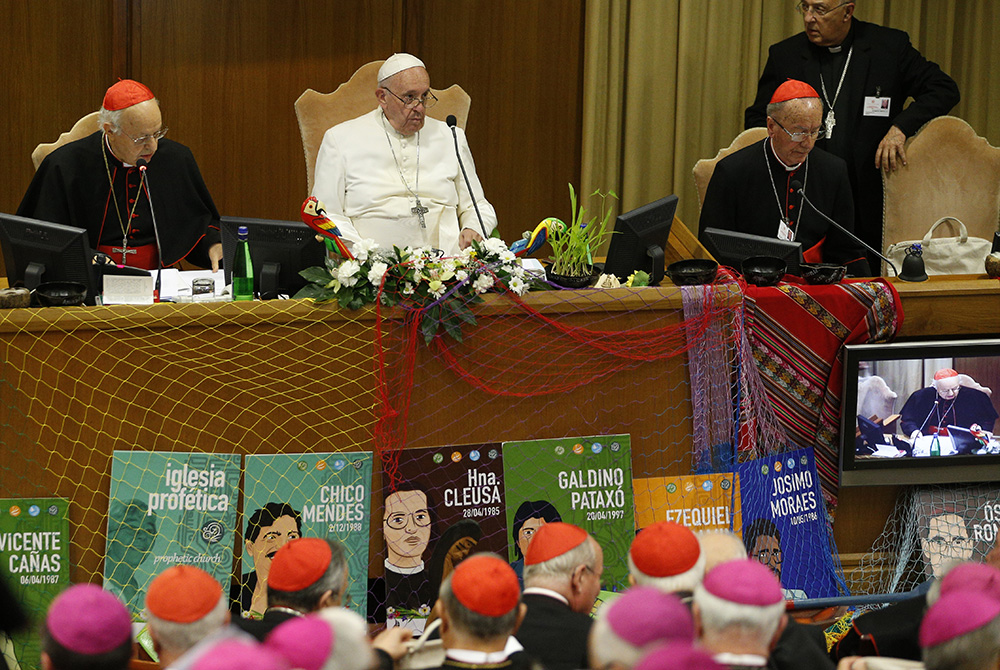
Pope Francis attends the final session of the Synod of Bishops for the Amazon Oct. 26 at the Vatican. Also pictured are Cardinal Lorenzo Baldisseri, secretary-general of the Synod of Bishops, and Cardinal Claudio Hummes, relator general of the synod. (CNS/Paul Haring)
The Vatican gathering of Catholic bishops from the Amazon has called on Pope Francis to allow for the priestly ordination of married men on a regional basis in order to address a lack of ministers across the nine-nation region.
And after the 185 male voting members at the monthlong Synod of Bishops said in their final document that the idea of ordaining women as deacons had been "very present" during their discussions, Francis announced he will be summoning his commission on the issue back to work, and adding new members to its ranks.
"I am going to take up the challenge … that you have put forward, that women be heard," the pontiff said in spontaneous remarks after close of the synod's business Oct. 26.
The dual announcements regarding possible new openings for Catholic ministry came at the end of an Oct. 6-27 gathering that focused on the serious environmental threats facing both the Amazon Basin and the people who have protected and called it home for centuries.
In the final document, released shortly after the pope's remarks Oct. 26, the bishops put forth a series of proposals to address both the rainforest and its people, including defining ecological sin and calling for the church across the Amazon to divest its finances from extractive industries that harm the planet.
The proposals are part of a 33-page text that was the fruit of intense discussion among the prelates and 80 lay auditors at the synod gathering, and an extraordinary level of outside attention and criticism during the monthlong process.
Setting forth the proposed definition of "ecological sin," the synod participants describe it in the original Spanish text as “an action or omission against God, against others, the community and the environment."
"It is a sin against future generations and manifests itself in acts and habits of pollution and destruction of the environmental harmony, transgressions against the principles of interdependence and the breaking of solidarity networks among creatures and against the virtue of justice," they state.
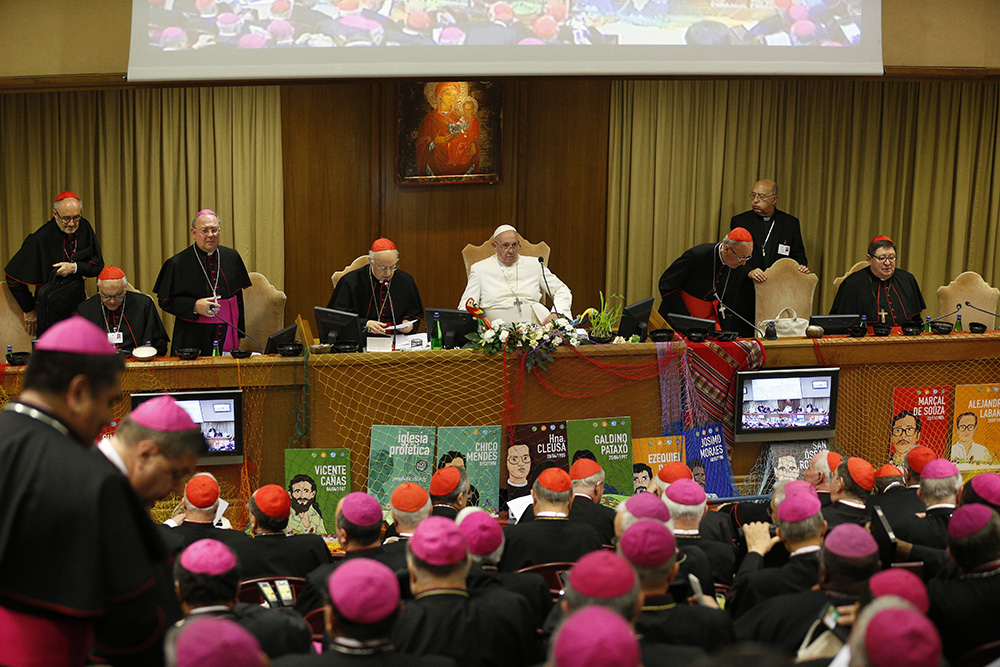
Pope Francis attends the final session of the Synod of Bishops for the Amazon Oct. 26 at the Vatican. (CNS/Paul Haring)
Although the discussions leading to the final document of the synod took place behind closed doors, it is known that the synod bishops — primarily from the Amazon, but also from other regions of the world — submitted hundreds of proposed amendments to the first version of the text.
Several unconfirmed reports said the first draft, presented at the synod Oct. 21, had been subject to some 800 amendments, an extraordinarily high number.
In past synods, changes to draft texts have sometimes come about in an effort to ensure the documents pass the vote threshold for their approval, which is two-thirds of the synod members present at the time of the tally.
Voting on the 2019 document took place late Oct. 26, with the prelates giving each paragraph of the text a simple yes or no. All of the 120 paragraphs of the document were adopted by the assembly with the required two-thirds: 120 members of the 181 present for the voting.
The closest margin came on the paragraph calling on Francis to consider priestly ordination of married men, which received 128 yes votes and 41 no votes. The second closest came on the paragraph dealing with the discussion on women deacons, which received 137 yes votes and 30 no votes.
'Right of community' to Eucharist
Ministry of married men and women emerged as key topics early in the synod, with many of the participants focusing on the need for the church to find a way to be more present in the Amazon's rural, hard-to-traverse areas.
Before bringing up the issue of married priests, the synod final text makes a number of references to the importance of the Eucharist in Catholic life. It cites Second Vatican Council documents as well as John Paul II's 2003 encyclical Ecclesia de Eucharistia, which states: "The church draws her life from the Eucharist."
"There is a right of the community to the celebration, which derives from the essence of the Eucharist and its place in the economy of salvation," says the synod text.
Continuing to their request of Francis, the bishops suggest the pope allow for current married permanent deacons to be ordained as priests, in order to "sustain the life of the Christian community through the preaching of the Word and the celebration of the Sacraments in the most remote areas of the Amazon region."
Possible candidates for the married priesthood, the bishops say, should "have a fruitful diaconate [and] … receive adequate formation for the presbyterate, while having a legitimately constituted and stable family."
In the area of women's ministry, the final text says that the synod bishops recognize the "ministeriality" that Jesus entrusted to women.
The document also notes that Francis' study commission on women deacons, which the pope created in 2016 following a request from the umbrella group representing the world's Catholic sisters and nuns, did not come to a final conclusion on the matter.
The pontiff gave a report from the commission back to the umbrella group, known as the International Union of Superiors General, in May. The report has not been released publicly.
The commission, the synod document says, "came to a partial result on what the reality of the women's diaconate was like during the first centuries of the church and its implications today."
"We would like to share our experiences and reflections with the Commission and look forward to its results," says the text.
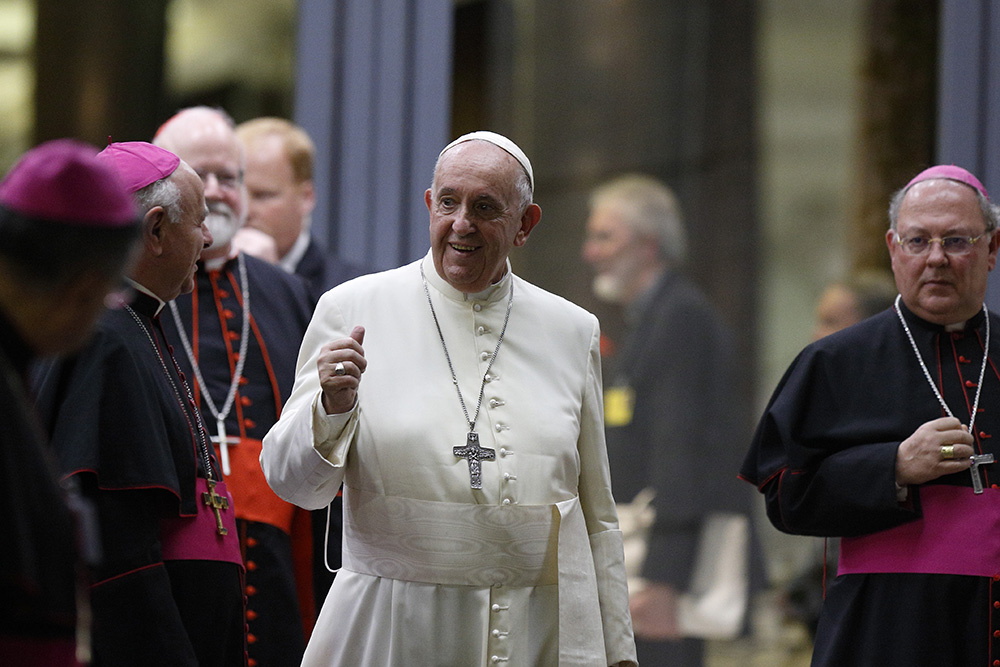
Pope Francis leaves the final session of the Synod of Bishops for the Amazon Oct. 26 at the Vatican. (CNS/Paul Haring)
Francis appeared to be referring to this portion of the text in his off-the-cuff remarks at the end of the voting process.
"I am going to try to reconvene this [commission] with the Congregation for the Doctrine of the Faith and appoint new people in this commission and take up the challenge," the pope promised the synod bishops.
"What is said in the document falls short of what the woman is; in the transmission of faith, in the preservation of culture," said the pontiff.
In a section of the final document prior to the focus on women's "ministeriality," the synod bishops say they consider it "urgent" for the church to "promote and confer ministries for men and women in an equitable manner."
"It is the Church of baptized men and women that we must strengthen by promoting ministeriality and, above all, the awareness of baptismal dignity," they state.
The synod members also make a point to note that a bishop has wide authority in his diocese to entrust any person, man or woman, with ecclesial responsibilities.
"In the absence of priests in the community, the Bishop may entrust, for a specific period of time, the exercise of pastoral care of the community to a person not invested with the priestly character who is a member of the community," they state.
"The Bishop may constitute this ministry on behalf of the Christian community with an official mandate through a ritual act so that the person responsible for the community may also be recognized at the civil and local levels," they continue.
'A frantic race toward death'
The synod document unfolds over five chapters, plus a brief introduction and conclusion. The text takes as its own the formal title of the synod — "The Amazon: New Paths for the Church and for an Integral Ecology" — with the latter four chapters each covering new paths for pastoral, cultural, ecological, and synodal conversion.
At the opening of the text the bishops say that all the participants of the synod expressed "a keen awareness of the dramatic situation of destruction affecting the Amazon," whether in the loss of territory for indigenous people to industrial development or the ruin of the biome itself.
"The Amazon rainforest is a 'biological heart' for our increasingly threatened land," they say. "It is on a frantic race toward death. It requires radical changes as a matter of urgency, a new direction to save it."
In chapter four, the bishops expand on ecological matters, stating it is necessary to respond to "an unprecedented socio-environmental crisis" confronting the planet. They call for international solidarity in recognizing "the central role" the Amazon plays in the global effort to limit climate change — what they identify as "above all" the greatest threat to life in the region.
"Faced with the pressing situation of the planet and the Amazon, integral ecology is not a path that the Church can choose for the future in this territory, it is the only possible way, because there is no other viable path to save the region," they say.
The bishops also speak movingly of activists in the Amazon who have risked their lives to call attention to the ecological crisis, saying environmental destruction there "is accompanied by the shedding of innocent blood and the criminalization of the defenders of the Amazon."
They continue later to call the protection of human rights a duty, and not an option, for Christians.
"The human being is created in the image and likeness of God the Creator, and its dignity is inviolable," say the bishops. "Therefore the defense and promotion of human rights is not merely a political duty or a social task, but also and above all a requirement of faith."
In some of the most forthright and political language of the text, the prelates say that in the face of the "prevailing destructive and extractive development model" they need to make clear: "Where do we stand? On whose side are we on? What perspective do we assume? How do we convey the political and ethical dimension of our word of faith and life?"
Answering one of their own questions, the bishops write, "We denounce the violation of human rights and extractivist destruction." In the same breath, they call for the church in the Amazon to join and support divestment campaigns from companies engaged in socio-ecological damage, and simultaneously advocate "for a radical energy transition and the search for alternatives."
The document does not specify how the bishops might determine from which companies to divest, and whether it would join the fossil fuel divestment campaign that has led roughly 150 Catholic institutions to wean their finances from coal, oil and natural gas. Of that group, only one from the Amazon region, the Diocese of the Holy Spirit of Umuarama, in Paraná, Brazil, has divested.
While humanity once held a "friendly" demeanor toward nature, the bishops decry that has been lost to "a voracious and predatory attitude" that squeezes to exhaustion every natural resource. They join in solidarity with the Amazonian people requesting states cease viewing the biome as "an inexhaustible pantry," and to implement sustainable development models that are inclusive and empowering of local communities.
The bishops also suggest the establishment of a global fund to repair "ecological debt" that other countries have incurred with the Amazon.
Among other recommendations:
- Development of "common home" training programs in parishes to raise awareness about the state of environmental problems;
- Creation of special ministers in the Catholic Church that would be charged with caring for the environment "at the parish level and in each ecclesiastical jurisdiction," and with promoting Francis' 2015 encyclical Laudato Si';
- Adoption of responsible habits around diet, energy and consumption to change consumer culture.
At a press briefing about the synod document late Oct. 26, Cardinal Michael Czerny said the images this summer of the Amazon rainforest burning has awakened in people an awareness that current ways of living are unsustainable.
"The ecological crisis is so deep that if we don't change, we won't make it," said Czerny, one of the synod's organizers.
Advertisement
The Oct. 26 document from the synod is not expected to be the final word on the Catholic Church's ministry across the Amazon region. In his remarks closing the synod's business, Francis said he was hoping to follow the bishops' text with his own document, likely to take the form of an apostolic exhortation, by the end of the year.
The pontiff also appeared to address the criticism the Amazon synod has drawn from more conservative quarters in the church, referencing what he termed "elite Catholics" who concentrate on "tiny things" but forget bigger issues.
"They think they are with God, but are not brave enough to understand humanity," said Francis, paraphrasing the early 20th century French writer Charles Péguy.
[Joshua J. McElwee is NCR Vatican correspondent. His email address is jmcelwee@ncronline.org. Brian Roewe is an NCR staff writer. His email address is broewe@ncronline.org.]
Editor's note: This story was updated 2:45 p.m. CST. The story has been updated to include additional reporting about the synod document.





